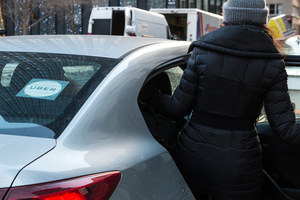
Early promise and sorrow
O’Connor was initially filed in 2013, and by 2016 Uber had offered $100 million to settle with a class of drivers in Massachusetts and California that had grown to 385,000.That settlement was rejected by the District Court for the Northern District of California because some of the drivers would have walked away with as little as $12.
Following the court’s rejection of the $100 million settlement offer, Uber won a ruling in Ninth Circuit upholding the company’s arbitration agreements. The decision forced most drivers to arbitrate their disputes individually. Uber has recently agreed to waive arbitration agreements with respect to sexual assault and harassment claims, but not for misclassification claims.
Individual arbitration can be prohibitively expensive for lower wage workers and typically leads to fewer and lower awards than a lawsuit. Drivers now claim that Uber is stonewalling requests for arbitration.
The decision reduced the affected class of drivers to about 13,600. These are the drivers who, for one reason or another, were not covered by arbitration agreements. (This is sometimes less a considered pre-litigation posture, than an impatient failure to click the “I Agree” box in a typical standardized work contract.)
The group still covered by the latest settlement offer will likely do better than they would have under the larger offer to the larger class. But it’s a relatively small group. The decision about the enforceability of Uber’s arbitration agreements was a big blow to drivers.
Beyond the “Make Money on Your Schedule” spin
“Be Your Own Boss.” Yes, it’s seductive, but unless you’re content to work for pocket change, the reality of gig work can be pretty grim. The New York Times recently told the tale of a 71-year old Uber driver, who is barely getting by. Sure, he has the time to make art (some of it angry), but his Nissan Altima has 218,000 miles on it, his credit is maxxed out at Midas, and he can neither afford to replace or repair the car he needs to drive to keep making money. As an independent contractor he is responsible for repairs and upkeep. When he drove a medallion cab, he only had to pay for gas.
A second significant issue highlighted in O’Connor was tips. At the time the lawsuit was filed, drivers received only a portion of the gratuity, which riders were misled to believe went directly to the driver. Uber now claims that it has improved its in-app tipping feature to address this problem.
The most important issues for most gig workers claiming misclassification as independent contractors, however, are not tips or work-related expenses, but minimum wage, overtime and benefit guarantees of California labor law.
How California law protects low-wage workers
To briefly review, effective January 1, 2019, the minimum wage for all industries in California is $12 per hour for employers with 26 or more employees and $11 per hour for employees with 25 or fewer employees. The minimum is higher in some cities, like San Francisco, where it is currently $15.59 per hour.
Further, California’s minimum wage laws require employers to pay covered employees for all hours worked. Hours worked include all time an employee is subject to the employer’s control and all time the employee is suffered or permitted to work, regardless of whether the employee is required to work or where the work is performed. Recent court decisions have made clear that this includes waiting time, on-call time and very short periods of time.
In California, the general overtime provisions require non-managerial employees to receive pay at one and one-half times the regular rate for more than 8 hours any workday or more than 40 hours in any workweek. Employment beyond eight hours in any workday or more than six days in any workweek requires compensation at up to double the regular rate for the overtime. California employees are also entitled to rest, meal and breastfeeding breaks as well as the protections of occupational safety and health laws.
California’s minimum wage, hours counting, overtime and break protections are relatively generous when compared to federal and some other state standards.
Big tech fights back
READ MORE CALIFORNIA LABOR LAW LEGAL NEWS
This can mean designating employees as managerial and thus “exempt” from legal protections. Or it can mean classifying workers as independent contractors and thus not employees at all. That is roughly where Uber’s efforts fit into the employment law landscape. There is every reason to think that it would be to Uber’s benefit to settle the O’Connor lawsuit before rolling out the IPO. There is more of this to come.
The plaintiffs’ attorneys, on the other hand, vow to fight on in the struggle to secure California labor employment law protections for gig workers. Not to be dead to irony, but this plays out against a background of a massively profitable stock sale.

READER COMMENTS
Ms. Jeanette Costoso
on